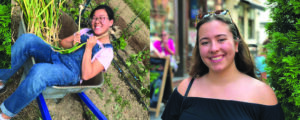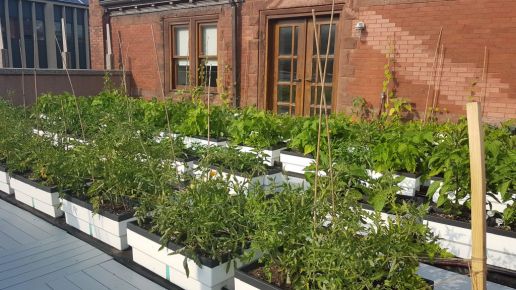
Better nutrition in the city. Cleaner food for the future. This summer’s crop of young researchers in Trinity’s Sustainable Food Systems Research Group (SFSRG) are not only contributing to a better food supply system for Toronto, but sowing the seeds of impactful careers to come.
Prof. Michael Kessler, Director and Raymond Pryke Chair in the Margaret MacMillan Trinity One Program, launched the research group in summer 2019 thanks to a generous donor. Following their first year, students from the Trinity One program enrich their studies via supervised individual research projects, work-study placements in campus gardens, and summer internships with partner organizations.
“The gift allowed us to prioritize promising younger students,” says Kessler. “It’s hard for undergraduates to gain access to meaningful research opportunities before their fourth year. Our goal was to connect them with these opportunities right away, and let them demonstrate that they can contribute even after first year.”
While the pandemic nixed student-led garden work this year for the budding program, Kessler and colleague Prof. Jayeeta Sharma found two projects that could be done remotely as part of Sharma’s U of T-funded COVID-19 research effort, Feeding the City: Pandemic and Beyond.
“The multidisciplinary research that I have undertaken with SFSRG has definitely shaped how I will approach science in my future career”
Angela Gong, who is entering her third year at Trinity, comes from a family who plants a 2,000-square foot garden through Fresh City Farms. She saw COVID-19’s impact first hand as markets couldn’t open until late June. Gong’s summer survey of other small growers assessed Toronto’s capacity for community gardens: How much could Toronto expand allotments? How to maximize their productivity?
“The multidisciplinary research that I have undertaken with SFSRG—working with both people and plants—has definitely shaped how I will approach science in my future career,” she says.
Meanwhile, soon-to-be-second-year student Maddie Frechette evaluated the sustainability of Toronto’s farm operations, and whether public policy nurtures or withers such systems. She found that short-term pandemic support programs were frustratingly bureaucratic, but farmers’ organizations hunger for long-term thinking, including policies that reward sustainable growing.
“This research has furthered my interest in the intersection of law and environmentalism,” she says. “I plan to work towards creating a more resilient food future in Canada.”
“I plan to work towards creating a more resilient food future in Canada”
Both projects have created valuable research related to the current pandemic, and will also support Trinity’s ambitious plans for the new Lawson Centre for Sustainability building, and a revitalized campus rooted in sustainable practices.
“Angela’s work will help inform our planned urban agriculture operation,” says Kessler. “We’re learning which plants thrive in the city, and what’s the best bang for your buck in terms of nutrients. Meanwhile, Maddie’s research is growing our knowledge base around food policy. These student reports will go into a local repository at Trinity and future students will be able to take up related research questions this fall.
“What’s really rewarding,” he adds, “is seeing students grow and develop their research skills. I’m so excited that this is going to continue for the next several years and that this project has become an integral part of making the College into a hub of undergraduate research related to sustainability.”

